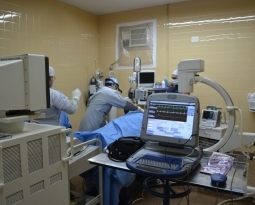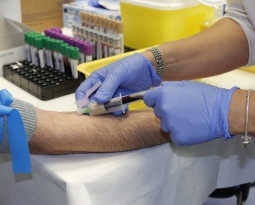Virginia Patent of the Month – September 2023
For decades, thyroid hormone replacement therapy has remained relatively unchanged. The primary treatment involved levothyroxine (T4), which was effective for many but left some patients with unresolved symptoms. These individuals often struggled with issues like weight gain, depression, and lethargy, despite receiving treatment.
Recent research has shown that a significant percentage of hypothyroid patients don’t respond optimally to T4 treatment due to genetic variations in the enzyme responsible for converting T4 into the active form, triiodothyronine (T3). This discovery prompted the exploration of T3 therapy, but existing T3 compounds faced challenges in terms of rapid absorption and short-lived effects. Synthonics, Inc., a privately-held specialty pharmaceutical company, is leveraging this research, developing a metallo-liothyronine supramolecule to treat hypothyroidism.
The innovation by Synthonics involves the creation of supramolecular polymeric structures that address these challenges. These structures consist of metal coordination complexes, with the key component being T3, a biologically active moiety. The metal coordination complex gradually releases T3 within the patient’s gastrointestinal tract, providing a controlled and sustained release of the hormone.
This controlled release is crucial for achieving normal T3 plasma levels, mimicking the natural thyroid hormone production in a healthy thyroid gland. Unlike conventional T3 therapies, which lead to fluctuating T3 levels in the bloodstream, these supramolecular structures aim to provide consistent and stable hormone levels, enhancing the effectiveness of treatment.
The potential impact of this innovation is significant. It offers hope for the approximately 15% of hypothyroid patients who experience insufficient improvement with T4 therapy alone. By providing a more natural and consistent T3 release, this approach has the potential to alleviate symptoms and improve the quality of life for many.
As the role of T3 therapy expands beyond hypothyroidism, the demand for an effective and reliable T3 product is expected to rise. With annual sales for thyroid hormones estimated at over $1 billion, a superior T3 product could have a substantial impact on the medical community and patients alike.
Synthonics has committed their expertise to the discovery and development of patentable drugs. Their innovations incorporate their proprietary metal coordination chemistry, binding metals to known pharmaceuticals to improve absorption and efficacy.
Are you developing new technology for an existing application? Did you know your development work could be eligible for the R&D Tax Credit and you can receive up to 14% back on your expenses? Even if your development isn’t successful your work may still qualify for R&D credits (i.e. you don’t need to have a patent to qualify). To find out more, please contact a Swanson Reed R&D Specialist today or check out our free online eligibility test.
Who We Are:
Swanson Reed is one of the U.S.’ largest Specialist R&D tax advisory firms. We manage all facets of the R&D tax credit program, from claim preparation and audit compliance to claim disputes.
Swanson Reed regularly hosts free webinars and provides free IRS CE and CPE credits for CPAs. For more information please visit us at www.swansonreed.com/webinars or contact your usual Swanson Reed representative.

















